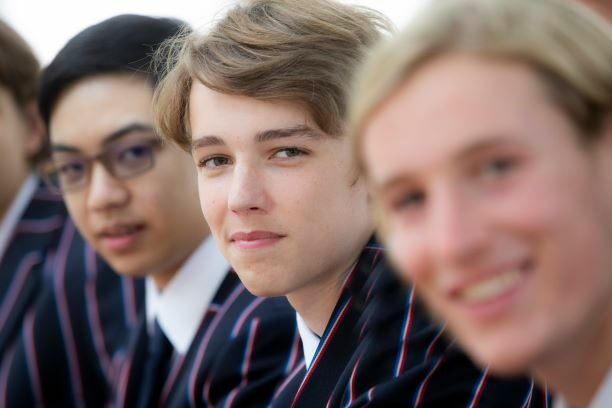Helping boys become respectful men
This piece by Jess Gabites was published in the Age on 22 May 2021A program on positive masculinity is having a positive impact on students’ wellbeing.
Our mental health has a significant impact on our lives: how we interact with others every day, how we plan our life goals and how we deal with stress. Much has been written about toxic masculinity: amongst boys and men there are higher rates of aggression, violence, suicide and poorer school engagement.
“What society has been doing isn’t working and new approaches are needed,” explains Ross Featherston, headmaster at Brighton Grammar School.
“We need to help our boys to learn skills, attitudes and behaviours to be life-ready. Recent research has shown that programs tailored for young men play a role in helping to shape perceptions of masculinity.”
Since Featherston’s appointment at Brighton Grammar in 2014, a key pillar of the school’s strategic and business plan has been a focus on being a leading school for boys, particularly in the area of mental health.
Brighton Grammar has actively linked with world-class authorities on boys’ education to launch a range of academic and wellbeing initiatives to develop a positive school culture that empowers students in their studies and lives.
And as a result, improved wellbeing outcomes have led to greater student engagement and stronger academic performance.
A major initiative in the student wellbeing program is the Positive Masculinity project, developed in conjunction with Orygen, the National Centre of Excellence in Youth Mental Health at Melbourne University.
In 2018, Brighton Grammar conduced an evidence review into young men’s mental health which was published in the peer-reviewed open access scientific journal PLOS One. The team then went through a design thinking process to create the +M framework (Positive Masculinity).
“Positive masculinity looks at masculine traits that are embedded in cultural practices, schools, community groups, and repurposes them in a healthier way,” explains Featherston.
Unique in Australia and internationally, the project uses a best practice model to help young men and boys develop into respectful men. It supports the development of healthy beliefs related to masculinity, mental health and wellbeing, and empower them towards self-health practices.
Since the program’s inception, the school’s research arm, the Crowther Centre, has created a curriculum, podcast series, position papers and numerous parenting workshops. Research into positive masculinity by Featherston, Dr Ray Swann (Deputy Headmaster, Head of Crowther Centre) and other educational experts has been recognised internationally, with an article on the school’s work in this space being published in the Health Promotion International Journal.
While the health and wellbeing program is introduced as young as the school’s Early Learning Centre, at the secondary school the focus becomes more targeted towards positive masculinity as they transition from boys to adults.
“Boys spend time learning about their identity: who they are, their personal brand, and focus on character strengths to build a stronger understanding of self. They learn to take a positive approach to a variety of real-life experiences and challenges while developing a growth mindset,” says Featherston.
Students attend workshops and outdoor education programs which include a series of circle time activities where boys speak openly about their emotions, their fears, their goals.
“They learn over the course of their journey about good mental health and that being authentic and motivated to share are positive attributes and enable a deeper level of connection,” he says.
In the senior years, conversations are had around cyberbullying, risky relationships, road safety, being party-safe. Parents and students can also access resources on these topics.
“Boys are challenged to re-think and have authentic dialogue around consent, respectful relationships, masculine stereotypes and redefining gender-norms.”
Improved wellbeing outcomes at Brighton Grammar have led to greater engagement and stronger academic performance. In 2020, the school recording its best academic VCE results in its history.
The median ATAR increased from 84.30 (2019) to 87.95 (2020), ATARs above 90 increased from 38 per cent to 49 per cent, ATARs above 95 increased from 16 per cent to 29 per cent, ATARs above 99 increased from six per cent, during the same period.
Meanwhile, Year 11 students, who had completed the greater part of the wellbeing programs were tested to see where they sat in terms of masculinity attitudes.
“The data shows that the average score (where a lower score is better on this seven-point scale – less likely to conform to harmful masculine stereotypes) was less than 2.”
Recognising the importance of what they are undertaking, Brighton Grammar will soon launch a +M website and continue to offer parenting webinars (open to the wider community), podcasts, books and more resources.
“Brighton Grammar prides itself in not only adapting and responding to our boys’ needs in times of change, but focusing on forward thinking approaches and measures to support not only our students, but to assist making a societal shift for all boys,” Featherston says.

